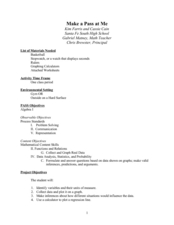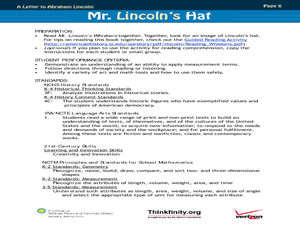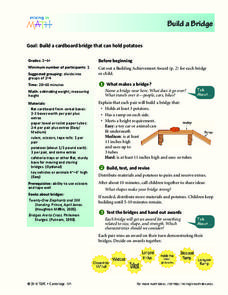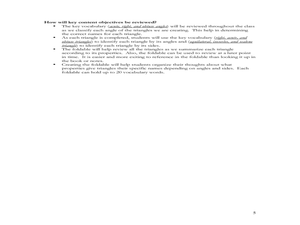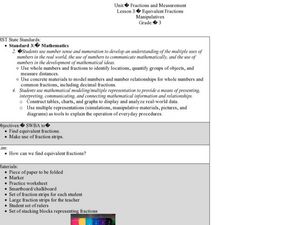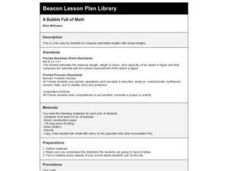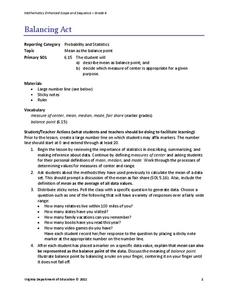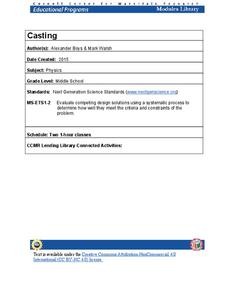Curated OER
Physics: Forces and Motion
Students recognize the effect of Earth's gravity on an object's weight. In this force and motion lesson students understand the role of gravity when you drop an object. Students experiment with small items. Students measure in Newton's....
Curated OER
Jumping to Solutions
Students explore two-step linear equations. In this middle school Pre-algebra instructional activity, students create and solve equations that describe how a person got to an end postion on a ruler by jumping. After...
Curated OER
Make a Pass at Me
Young scholars identify different types of functions and units of measurements. In this statistics instructional activity, students will collect data, graph their data and make predictions about their data. They plot a linear...
Curated OER
Color Dots 2
Students develop simple observations. They observe bleeding of colored inks with water, to understand mixtures, and to make generalized inferences from their observations.
Curated OER
Projectile Motion
Students observe projectile motion and calculate the speed of a baseball based on the time and distance traveled. They record the time, measure the distance, and draw the path of the ball's travel on a data table.
Curated OER
Jack and the Beanstalk
Third graders read a story and grow a beanstalk. In this literature and life science lesson, the class reads "Jack and the Beanstalk," then lists fairy tale elements and write a puppet show. The students plant pinto beans and observes...
Curated OER
Mr. Lincoln's Hat
Bring out the inner artist with this Abraham Lincoln lesson plan. Elementary students work on a home project creating a hat similar to Abraham Lincoln's hat. They will use geometry and measurement to create the scale of the hat, then...
Curated OER
Build a Cardboard Bridge That Can Hold Potatoes
Students identify the characteristics of a bridge and build with junk materials. In this bridge building activity, students use cereal boxes, paper towel or toilet paper tubes and tape to create their bridges. Bridges...
Curated OER
Angles in Triangles
Eighth graders translate word problems using mathematical ideas. In this geometry lesson plan, 8th graders identify angles of triangles using equations and the triangle sum theorem. They create angles with a protractor and straight edge.
Curated OER
Show Me the Way To Go Home
Learners place a pencil perpendicular to the ground and trace its shadow between 11:30 AM and 12:30 PM. They measure the length of the shadow, periodically over several hours, in either English or Metric units. Using the data, they find...
Curated OER
Equivalent Fractions Manipulatives
Students study fractions. For this equivalent fractions lesson, students utilize fraction strips to enhance their understanding of equivalent fractions. They watch a demonstration and then work independently with their own set of...
Curated OER
Inches and Feet
In this inches and feet worksheet, young scholars, with a partner, estimate and measure the answers to five word problems dealing with inches and feet.
Curated OER
All About Me
Third graders investigate the use of centimeters while measuring items with rulers which they construct. They examine the need for standard units of measure. They estimate the length of body parts before making the actual measurements.
Curated OER
Dizzy Heights
Fifth graders explore ways to measure the height of an inaccessible object. They measure lengths using a tape measure or ruler. Students measure angles using a protractor and estimate heights.
Curated OER
"Use an Anemometer," said the Meteorologist
Students participate in an hands-on construction of an instrument to measure wind speed.
Curated OER
Area and Volume
What is the difference between area and volume? Have your charges build models of square centimeters, square inches, square feet, square meters, etc. It's definitely challenging, but there is no better way to learn than by trying...
DiscoverE
Tunnel Meetup
Meet me in the tunnels. Scholars choose a tunnel entrance and mark it on their side of the cardboard. They describe the location to their partners and see if they can guess each other's locations. Punching a hole through the cardboard...
NASA
Rocket Wind Tunnel
Using a teacher-built wind tunnel constructed from a paper concrete tube form, a fan, and a balance, individuals determine the amount of drag their rocket design will experience in flight. Pupils make modifications to increase the...
Virginia Department of Education
Balancing Act
How many different interpretations of the mean are there? Scholars place numbers on a number line and determine the mean. They interpret the mean as the average value and as the balance point.
Scholastic
Discussion and Dissection of an Owl Pellet
Young scientists get the chance to dissect pellets "owl" by themselves to determine the owls environment and nourishment. This is the third part of a three-part series.
EngageNY
Rotations
Searching for a detailed lesson to assist in describing rotations while keeping the class attentive? Individuals manipulate rotations in this application-based lesson depending on each parameter. They construct models depending on the...
Chicago Botanic Garden
Historical Climate Cycles
Scientists use ice core samples to obtain temperatures of the earth from 400,000 years ago! The third of five lessons instructs pupils to interpret historical climate data to see changes over time. In part I, participants interpret...
Cornell University
Casting
Don't cast a great hands-on resource aside! Scholars learn about the process of casting by actually trying out an example. Plaster of Paris and cookie cutter molds help them complete the activity.


